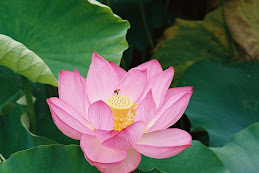Some lessons from the story of Buddha's life:
*In his early attempts at self-denial, Buddha tried an ascetic path - sitting on a bed of nails, reducing his diet to nothing but a grain of rice per day. This path was no road to self-denial, but more self-destruction. It was when he was almost unconscious in the woods and found by a girl who fed him that he came to the great realization that a healthy body is key to our happiness.
Buddha says eat!! Too many religions project the body as something evil. But you can't reach a goal of happiness and enlightenment if your body is too weak to keep going! Just like the connections of everything around us, there is a great connection between our mind and our body. When one is unhealthy, the other follows in tandem. One must be healthy if one is to find happiness.
*Forget about dualism. We spend too much of our lives on an extreme that is unnecessary. Examine both sides, and discover the median. Hear out both sides and find the road in between. This is what Buddha refers to as "The Middle Way"
Just think of how much stress, aggravation, and sometimes even hatred we put ourselves through because we are so pig-headed as to only see one side. We can find so much more peace - by simply finding the middle ground and leaving our extremes behind.
*Step back and see the larger picture. A woman, whose in-laws were growing cold to her because she couldn't give their son an heir, finally had a child, but it died during birth. She took the child to Buddha and asked him to resurrect the child. (She did not seem to understand he never claimed such abilities). Buddha told her that before he could do anything, she had to go into the village and get him some mustard seeds from a home. But, the seeds had to come from a home that had not been touched by death. The first home she went to, sure enough, they'd give her seeds, but the family noted they had just lost a father. She went to the next house, the next, and the next, all with the same result. She returned to Buddha understanding, and buried her child.
It becomes so easy for us to take a look at our need, what it is that we are looking for. We all have goals, and can often times be blinded by those goals. The woman came to Buddha because she wanted her child brought back to life. But as she went from house to house, she quickly realized that death was not picking on her - it is universal - and none of us are free from it. He never told her "forget about it" or "move on" or "it'll get better someday." He gave her a way to see that her loss is part of something bigger.
*Those who try to ask why the universe is created is like a man who's been shot by a gun. Before going to see a doctor, he wants to know exactly who shot him, from where, with what type of gun, what type of bullet, and how the bullet was made.
We can spend eons debating the wheres and the whys, wasting our lives away instead of enjoying what is now. These theoretical questions take away from what it is Buddha is trying to teach us, which is the nature of suffering and the freedom from it.
Summer Transitions - An Update
10 years ago


No comments:
Post a Comment